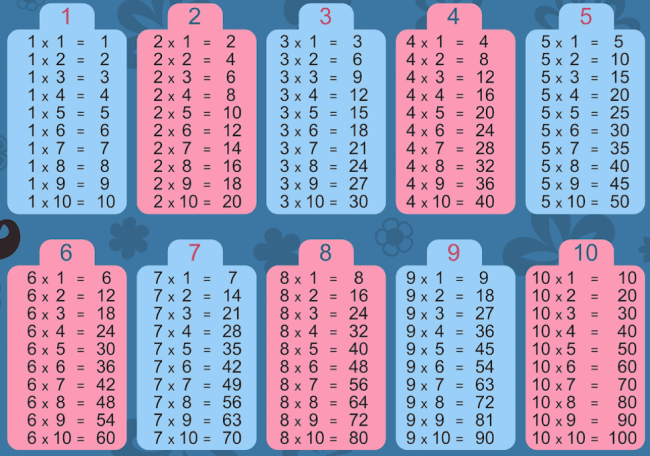Many of us can remember learning multiplication and division as children. Chanting and reciting full sets as a class, revising the multiplication table at home with our parents; you might have even had a poster of them Blu-tacked to your bedroom wall.
The jump from knowing how to add and subtract numbers to becoming familiar with multiplication can feel large and complex. However, once mastered, it can become second nature to a child and is fundamental in day to day life.
At St Peter’s we pride ourselves on ensuring all of our pupils are given the support they deserve from the very beginning, laying the groundwork at our private preschool in Devon. We aim to allow them to flourish in a variety of subjects, including maths and, of course, their times tables.
Why Is Multiplication Important?
You may be thinking, “a calculator can easily solve large sums, so is multiplication really that important?”. Learning times tables by rote is one of the fundamental building blocks of a child’s education for a reason.
We all know how essential maths is for personal growth and success. Not only does arithmetic skill help ease the transition into adult life, but it can bolster one’s talent in other important subjects like science.
Creating familiarity with times tables in the pivotal early stages of a child’s academic life will prevent maths from becoming a hated subject for them in future.
A good knowledge of multiplication can give children a sense of independence and teach them to think on their own by reducing over-reliance on technology. It can be considered a form of daily mental training that can considerably improve cognitive functions, boosting your child’s brain power to help them achieve goals and foster long term self-confidence.
Below, we delve into some of the most significant advantages your child can gain from learning multiplication.
Advantages of Learning Multiplication
Although many of these methods of teaching multiplication have become outdated, the importance of learning these mathematical basics is as important today as it has ever been. Key advantages include:
- Application in daily life
- Integral to developing basic mathematical building blocks
- Building confidence with more complex tasks
- Gaining a conceptual understanding of multiplication and deeper thinking process
- Improving problem-solving abilities
- Developing key skills and ‘number sense’
Multiplication is the main tool for many forms of maths such as algebra, calculus, equations and more. The ability to rehearse and understand multiplications up to and including 12 by the final year of primary school will enable your child to confidently and skilfully tackle more complex mathematical subjects.
It also helps children to familiarise themselves and feel confident with the teachings presented to them as they progress through education.

1. Importance of Multiplication and Division in Daily Life
A transferable skill, many of the tasks children encounter at school and at home involve multiplication. Examples may include:
- Laying the table for dinner when guests are expected.
- Calculating exchange rates for spending money on holiday.
- Working out the days of the weeks, months or years.
These daily uses of multiplication come naturally to many and demonstrate its necessity, reinforcing the importance of learning this from a young age.
2. Builds the Basic Mathematical Blocks and Confidence with More Complex Tasks
Multiplication can, in fact, be an enjoyable and rewarding subject to master. As part of each person’s mathematical ‘toolbox’, multiplication is fundamental for enabling your child to succeed in what can often be considered a daunting subject.
The ability to fully understand multiplication, have fluency, and have instant recall will boost your child’s confidence in the subject. It will also allow your child, as they progress through their school years, to build upon their skillset with more ease as the mathematics taught becomes more complicated.
Generally, division and long multiplication are introduced into a child’s curriculum following basic multiplication. Without this primary knowledge, the following stages would feel much more intimidating to pupils.

3. Learning Outcomes of Multiplication
Children should gain a conceptual understanding of multiplication so they can comprehend ‘why’ and ‘how’ the times table functions, rather than just ‘what’ the answer is. This deeper thinking process allows for meaningful application, enabling them to successfully implement the skill in other aspects of their learning.
That’s right, multiplication skills don’t just help with maths! They can also boost communication skills, improve memory and make rehearsals of speeches or scripts easier, help gain analytical and numerical skills for science, and even apply to subjects you wouldn’t expect! For example, the renowned artist M.C. Escher is often noted for implementing a geometrical approach to his works.
Don’t just dismiss maths as a dry, boring subject. There’s plenty of fun and creative maths exercises to discover!
4. Improved Problem-Solving Abilities
As a child becomes faster at recalling multiplications of 2 -12, they will be able to solve more complex maths in much less time. This is because the core understanding has already been established. They will exercise this skill like second nature, enabling them to focus on the more difficult aspects of the task.
5. Promotes Number Sense
Maths, in most circumstances, is a manipulation of numbers in many different forms. However simple or complex, these tasks require a strong ‘number sense’.
Developing key skills and routinely practising them supports your child’s development of number sense. This can include progressive skills in:
- Counting
- Grouping
- Estimation
- Quantity
- Time
- Distance
Introducing brains teasers and puzzles is another great way to encourage children to practice their maths skills in a way that engages them and sharpens their skills.

Encouragement and Praise
Many children can find learning their times tables challenging; it requires a high level of both patience and dedication. Supporting your child through their education by using encouragement and praise allows them to feel confident in their educational journey, helping them to excel in the subject.
The quality of praise is fundamental when motivating your child to learn something new; a good example is prioritising the effort rather than the final task.
If you are interested in the educational opportunities provided at St Peter’s Prep or would like to request a prep school prospectus, please contact Rachel Jupp, Director of Admissions & Marketing, on 01395 280335 or email rachel.jupp@stpetersprepschool.co.uk.











